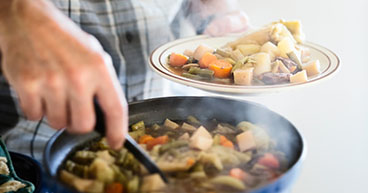
How often have many of us declared that we’d eat healthier—if only?
- If only we had more time to prepare healthier meals
- If only we knew how to cook more nutritiously
- If only we weren’t so tired after the commute from work
If there’s one thing a global pandemic has afforded many of us, it’s more time. Traveling, eating in restaurants and other activities that used to take us out of our homes have been reduced or eliminated.
So, if you’re staying home more and have a little extra time, it’s a great opportunity for you and your family to get in the kitchen and experiment with different, healthier foods, if you have the energy for it, says Carolyn Lammersfeld, MBA, MS, RD, CSO, LD, Vice President of Integrative Care Services at Cancer Treatment Centers of America® (CTCA).
“With COVID-19, people are eating home more, and this may be a good time to revisit their diet,” she says. “Use this time to incorporate more plant-based foods into your diet.”
The American Institute for Cancer Research recommends limiting the amount of red and processed meats people consume and instead integrate more plant-based foods—vegetables, fruits, whole grains and beans—into their diets. In addition to being low in calories and high in fiber, plant-based foods contain phytochemicals, compounds that may help protect the body from cell damage that could lead to cancer.
Research suggests that eating a plant-based diet is associated with a lower risk of developing certain cancers, heart disease, diabetes, and other chronic conditions, may be decreased by eating a plant-based diet. According to the British Medical Journal, phytochemicals, which give produce their color, may enhance DNA repair pathways and “have direct effects on the fundamental hallmarks of cancer progression and metastasis.” In addition, eating a plant- based diet may help with weight management. Carrying extra body weight is a significant risk factor for many cancers.
So how to get started? Lammersfeld suggests taking baby steps.
“Some people clean out the whole kitchen and do it overnight, but the most practical approach is to start small,” she says. “If you never eaten fish, experiment with making fish once a week. The same for beans. Try a meatless Monday or a vegetarian meal once a week in place of a meat meal, or a meal with processed foods.”
Other ideas:
- Count your daily sugar intake (Dietary Guidelines for Americans encourages limiting added sugars to no more than 10 percent of daily calories).
- Prepare more fruit-based desserts.
- Eat a serving of fruit and a serving of vegetables with every meal.
- Incorporate exercise into your daily routine, if possible and approved by your doctor.
“Pick one or two, no more than three, goals you can set for yourself for a month,” Lammersfeld suggests. "In general, there’s nothing you have to avoid completely. The guideline recommendation to reduce red meat and processed meats is primarily due to the association with colon cancer risk. Eating a balanced, more plant-based diet makes sense for all people, but particularly for cancer patients. It’s good for your heart, and may help reduce the risk of a recurrence or secondary cancer, particularly if you are carrying extra body weight.”
Of course, each individual’s cancer type and unique situation impact dietary recommendations. For example, Lammersfeld says a patient with a partial bowel obstruction as a result of advanced gastrointestinal or a gynecological cancer may need to follow a low-fiber diet or liquid diet for a period of time due to the fact that digested food cannot easily pass through the narrowed area of the bowel.Plant-based foods with fiber may increase risk of producing symptoms from a partial bowel obstruction.
During treatment, blood cancer patients undergoing stem cell transplant may be advised to reduce their consumption of certain raw fruits and veggies because of a weakened immune system, while those with head and neck cancer may have to rely heavily on a liquids-only diet to help them get sufficient amounts of nutrients. And always talk to your doctor about whether to eat grapefruit or drink grapefruit juice since grapefruit can interfere with certain medications.
Juicing is a way to incorporate more healthy foods into the diet, particularly for patients who may need additional calories and nutrients. Lammersfeld cautions that it’s important to be aware that doing so may raise the carbohydrate content to excessive levels (because the body converts most carbohydrates to glucose, which can raise blood sugar levels).
“Think how many carrots would go into a 4-ounce glass of carrot juice,” Lammersfeld explains. “It’s way more than if you were eating the carrots. An unusually high amount of carbohydrates may cause blood sugar to quickly spike or drop.”
Finally, Lammersfeld suggests reframing how you think about food. Be mindful that transitioning to a more plant-based diet may aid your recovery. “Remind yourself that whatever recommendations were made for you based on your specific medical situation are designed to help keep you healthy and support your immune function,” she says.

